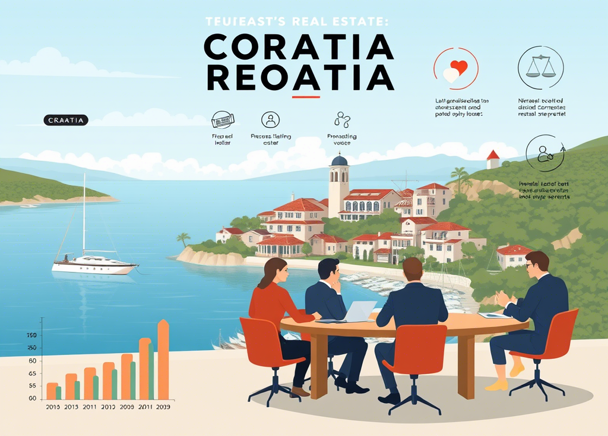Pros and Cons of Croatia for Real Estate Investments
11950 31.03.2025, 16:37 0 Инвестиции
Croatia, with its stunning coastline, charming towns, and rich history, has become an increasingly attractive destination for tourists and, consequently, a hot topic for real estate investors. The allure of owning a slice of the Adriatic, promising rental income and capital appreciation, is strong. However, like any investment, Croatia's real estate market presents both compelling opportunities and potential challenges. This article delves into the pros and cons to help you determine if investing in Croatian property is the right move for you.
The Alluring Advantages: Pros of Investing in Croatian Real Estate
Booming Tourism and Rental Potential: Croatia's tourism sector is booming. The country's popularity has surged in recent years, attracting visitors from around the globe. This translates directly into strong rental demand, particularly during the peak summer season. Coastal properties, especially those with sea views or proximity to beaches, offer significant potential for generating lucrative rental income through platforms like Airbnb and Booking.com.
Relatively Affordable Prices (Compared to Western Europe): While prices have been steadily increasing, Croatian real estate remains relatively affordable compared to similar properties in established Western European markets like France or Italy. This allows investors to acquire larger or more desirable properties for a lower initial investment.
Natural Beauty and Lifestyle Appeal: The breathtaking natural beauty of Croatia is undeniable. From the rugged Dalmatian coast to the idyllic islands and lush national parks, the country offers a lifestyle that is hard to resist. This inherent appeal attracts both tourists and potential long-term residents, ensuring sustained demand for real estate.
EU Membership and Political Stability: Croatia's membership in the European Union provides a level of political and economic stability that can be reassuring for foreign investors. It also simplifies certain legal and administrative processes, although challenges still exist (more on that later).
Growing Economy: Croatia's economy is steadily growing, fueled in part by the tourism sector. This positive economic outlook contributes to increased confidence in the property market and the potential for long-term capital appreciation.
Diverse Property Options: From modern apartments in bustling cities like Zagreb and Split to traditional stone houses in charming coastal villages, Croatia offers a wide range of property types to suit different investment strategies and budgets. You can find opportunities in renovation projects, new developments, and established residential areas.
Improving Infrastructure: Croatia's infrastructure, including roads, airports, and utilities, is constantly improving. This enhances the connectivity and accessibility of different regions, making them more attractive for tourism and investment.
Navigating the Challenges: Cons of Investing in Croatian Real Estate
Complex Legal Framework and Bureaucracy: Navigating the Croatian legal framework can be challenging, particularly for foreign investors. Property laws, zoning regulations, and administrative procedures can be complex and time-consuming. It is crucial to engage a reputable local lawyer and real estate agent who are experienced in dealing with foreign clients.
Property Ownership Restrictions for Non-EU Citizens (Potentially): While Croatia is in the EU, specific restrictions on property ownership may apply to non-EU citizens depending on their country of origin. These restrictions often involve reciprocity agreements with the individual's home country. Thorough research is crucial to understand the applicable rules before making any investment.
Seasonality of Tourism: While the summer season is highly profitable, tourism drops off significantly during the off-season. This can impact rental income and occupancy rates for properties located in tourist hotspots. Diversifying rental strategies and targeting off-season travelers can help mitigate this risk.
Earthquake Risk:Certain regions of Croatia are prone to earthquakes. It is essential to conduct thorough due diligence on the structural integrity of any property, particularly older buildings. Insurance coverage is also crucial.
Aging Property Stock: A significant portion of Croatia's property stock is relatively old and may require extensive renovations to meet modern standards. While this presents an opportunity for value creation, it also involves potential risks and costs.
Price Volatility and Overvaluation in Certain Areas: The popularity of certain coastal areas has led to price increases and potential overvaluation. It is crucial to conduct thorough market research and compare prices with similar properties in different locations before making any investment decision.
Property Management Challenges: Managing a property remotely from abroad can be challenging. Hiring a reliable property management company is essential to ensure smooth operation, maintenance, and tenant communication.
Conclusion: Is Croatia Right for You ?
Investing in Croatian real estate can be a rewarding experience, offering potential for rental income, capital appreciation, and the enjoyment of a desirable lifestyle. However, it's crucial to approach this market with caution and conduct thorough research. Weighing the pros and cons carefully, engaging with local experts, and understanding the legal and regulatory landscape are essential steps for making informed and successful investment decisions. Ultimately, whether Croatia is the right fit for you depends on your individual investment goals, risk tolerance, and willingness to navigate the complexities of this dynamic market.
Подпишитесь на нашу рассылку и получайте новые статьи прямо на почту
Новости по теме
Комментарии (0)
добавить комментарийДобавить комментарий
показать все комментарииВидео-репортажи
показать ещеReal Estate
- Home
- Projects
- PR Advertising
- Agreement
- Products
- Marketplace
- Contacts
- Manufacturers
- Site Map
- Хостинг от uCoz
© Project Company Holding Marketplace - 2025